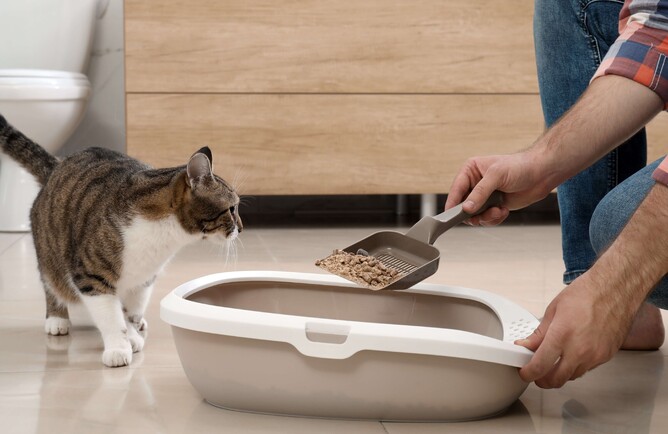Zoonotic diseases are animal illnesses that can be transmitted to humans.
They can be bacterial, viral, parasitical, or fungal. Below are some of the main ones to watch out for and ways to help protect yourself against them:
Bacterial diseases
Examples of bacterial diseases that you can contract from your pets are salmonellosis, campylobacteriosis and leptospirosis.
Salmonella
Pets with gastrointestinal symptoms can pose a risk for spreading salmonella, but it can also be spread by non-symptomatic ‘carrier’ animals who shed enough bacteria to go on and infect other animals.
Symptoms in humans include diarrhoea, fever, and stomach cramps and these may begin between six hours and up to six days after infection, usually lasting for several days. However, for some people, the infection can also cause serious illness and last for several weeks.
To prevent infection, it is important to use good hygiene, such as washing hands with soap and water before and after preparing or eating foods, having contact with animals, and after using the bathroom or changing a nappy.
Livestock can be protected from salmonellosis through regular vaccination and sound farm management practices.
Campylobacteriosis
Campylobacteriosis is one of the most common causes of gastrointestinal illness in people. Symptoms include diarrhoea, abdominal pain and cramps, fever, and vomiting.
Dogs and cats may become infected with campylobacter by ingesting infected faeces, infected food (such as raw meat - especially poultry), unpasteurised milk, or contaminated water.
Leptospirosis
Leptospirosis can be spread to humans through contact with the urine from infected animals like rats, hedgehogs, possums, or farm livestock. It can also cause serious and rapid illness in dogs. The disease in dogs is more common in warm, wet climatic regions, in dogs that have access to the outdoors.
At present, lepto vaccinations are not routinely included in the standard core vaccinations given to dogs in our southern NZ regions. However, infections have occurred and dog owners should discuss whether there is a need for preventative vaccination with their vet.
People who live on rural properties must be aware of this disease as there are several strains of lepto present in farm livestock. Farmers and livestock workers and their families are at risk of contracting the disease from the urine of infected stock, or from water, soil or food contaminated with the urine. As such, vaccinating livestock against lepto is an important tool to protect yourself, your staff and your farm.
Symptoms in people include having a high temperature, a headache, nausea or vomiting, diarrhoea, body aches and pains, jaundice (yellowing of skin and eyes), red eyes, and a loss of appetite.
Without treatment, leptospirosis can also lead to kidney and liver damage and even death. The disease can be treated with antibiotics which will clear the infection, so be sure to mention it to your doctor if you suspect lepto to be the cause.
Listeriosis
Listeriosis is another zoonotic bacterial infection that causes several types of infections in livestock. Humans mainly get infected from contaminated foods, but particular care must also be taken when handling material from clinical cases and aborted fetuses in livestock.
The disease in humans can cause miscarriage and stillbirth in pregnant women and serious infections in children and adults.
Parasites
Worms are another example of zoonotic illness that can be passed from pets/animals to people.
Roundworm eggs passed in the faeces of pets can contaminate the soil in gardens, or sandpits and playgrounds. If this then gets onto your hands, food, shoes or clothing and is then accidentally ingested, you can become infected.
Hookworm larvae in contaminated soil can penetrate the skin of bare feet and hands!
Cats and dogs may carry the parasites giardia and cryptosporidium in their intestines. The incidence of zoonotic transmission of these organisms from pets is low, but there have been significant outbreaks of illness from the contamination of streams and public water supplies.
Cats are also the primary host for toxoplasmosis (toxo) - a disease caused by infection with the toxoplamsa gongii parasite. When cats are infected, usually as kittens, they pass oocytes in their faeces for a couple of weeks but may not display any signs of illness.
These oocytes contaminate the environment and are ingested by other mammals and birds, where they form cysts in the animals' tissues and organs. Cats are infected by eating the tissues of these intermediate hosts, or by the ingestion of oocytes that have contaminated soil, water, and vegetation.
Humans can be infected with toxo by eating contaminated foods, unwashed produce, and undercooked meats, or by ingestion after contact with cat faeces (cleaning litter trays) or contaminated soil when gardening or playing in sandpits.
The infection in humans is usually mild and associated with flu-like symptoms, but as with most zoonotic diseases, the risk is higher in young children or anyone with compromised health. Toxo also poses a significant risk to pregnant women as it can cause miscarriage.
External parasites, such as fleas, ticks, and mites, and the fungal skin disease ringworm, can also be passed from pets to people.
Cat scratch disease is caused by bacteria called Bartonella, transmitted by fleas. It can be spread from a scratch or bite wound, from flea dirt (faeces) or potentially from the fleas themselves. It can cause fever, swollen lymph nodes, and red bumps on the skin.
Protecting yourself against zoonotic diseases
Young children, pregnant women, the elderly, and people with weakened immune systems are most at risk of contracting a zoonotic illness.
If you fall into one of these categories, it does not mean you have to give up your pet. It simply means that you should take some precautions, such as monitoring your pets for any signs of illness, washing your hands after extensive handling of your pets, and avoiding direct contact with their faeces and urine.
Prevention of zoonotic infection includes following hygienic practices when handling pet food and toys, cleaning cages, kissing pets, and cleaning litter trays.
Pet owners should always wash their hands:
After touching or playing with their pet,
After feeding their pet or handling pet food,
After handling pet habitats or equipment (cages, tanks, toys, food and water dishes, etc),
After cleaning up after pets,
After leaving areas where animals live (coops, barns, stalls, etc.), even if you did not touch an animal,
Before eating and drinking,
Before preparing food or drinks,
After removing soiled clothes or shoes.
Running water and soap are best for hand washing, but hand sanitiser can be used until running water and soap are available. Adults should always assist young children with hand washing.
Other things to consider for your pets, to prevent the transmission of zoonotic illness, are:
Regular worming,
Year-round external parasite control,
Regular veterinary checks,
Avoiding feeding raw meat,
Vaccination programme,
Selecting the right pet for you and family.
Zoonotic diseases are usually preventable through good hygiene, and following pet health standards with regular vaccinations, worming and parasite control.

